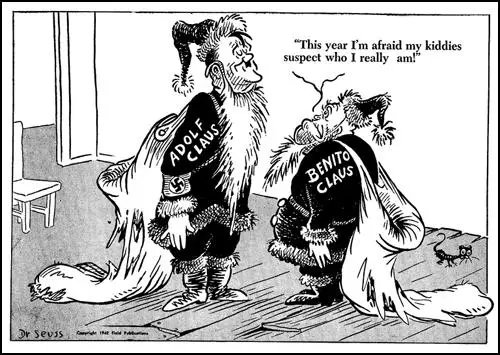On this day on 24th September
On this day in 1066 King Harold defeated King Harald Hardrada and Tostig at Stamford Bridge. Both Hardrada and Tostig were killed. The Norwegian losses were considerable. Of the 300 ships that arrived, less than 25 returned to Norway. While celebrating his victory at a banquet in York, Harold heard that William of Normandy had landed at Pevensey Bay on 28th September. Harold's brother, Gyrth, offered to lead the army against William, pointing out that as king he should not risk the chance of being killed. "I have taken no oath and owe nothing to Count William". Harold rejected the advice and immediately assembled the housecarls who had survived the fighting against Hardrada and marched south. Harold travelled at such a pace that many of his troops failed to keep up with him. When Harold arrived in London he waited for the local fyrd to assemble and for the troops of the earls of Mercia and Northumbria to arrive from the north. After five days they had not arrived and so Harold decided to head for the south coast without his northern troops.
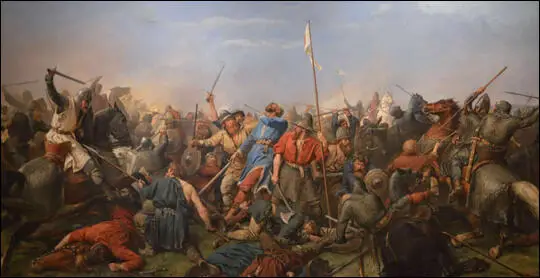
On this day in 1486 Prince Arthur, the son of King Henry VII, was baptized in Winchester Cathedral. He was born prematurely and spent the first months fighting for his life. In March 1488, the Spanish ambassador at the English court, Roderigo de Puebla, was instructed to offer Henry a deal. The proposed treaty included the agreement that Henry's eldest son, Arthur, should marry Catherine of Aragon in return for an undertaking by Henry to declare war on France. Henry enthusiastically "showed off his nineteen-month-old son, first dressed in cloth of gold and then stripped naked, so they could see he had no deformity." Puebla reported that Arthur had "many excellent qualities". However, they were not happy about sending their daughter to a country whose king might be deposed at any time. As Puebla explained to Henry: "Bearing in mind what happens every day to the kings of England, it is surprising that Ferdinand and Isabella should dare think of giving their daughter at all."
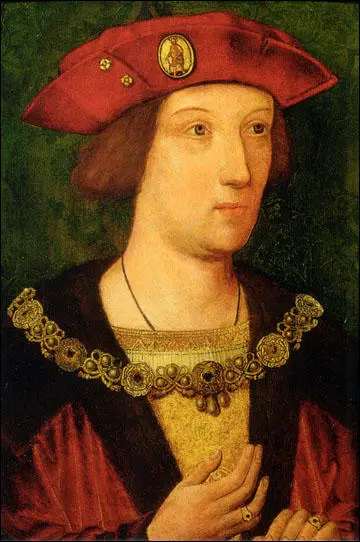
On this day in 1831 Richard Potter made a speech warning of the dangers of the House of Lords voting against the Great Reform Act. "I have no language adequate to express my dread I feel of the (House of Lords) rejecting it (Reform Bill). I have no nerve to reflect upon the consequences of such a course - and I am sure that if they do reject it, not only will their own order be endangered, but everything that is valuable in this fine country. Gentlemen, I call upon you, as you value your families, as you value your friends, as you wish to retain your property, and, above all, as you love your country, to use all the influence you possess (and every man does possess influence) to endeavour to carry this great measure."
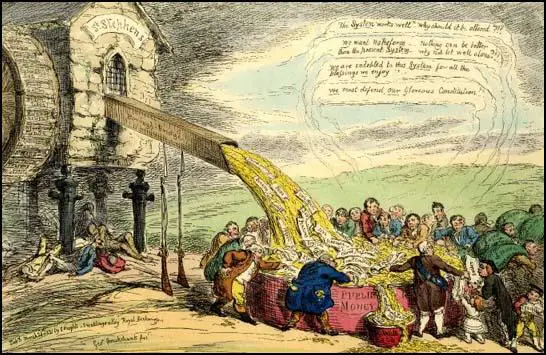
The House of Commons is shown as a water mill. The water wheel bear the names of rotten
boroughs. Underneath lies the corpses of the poor, and from the mill pours a stream of benefits
of being MPs, which they stuff in their pockets, while praising the system and opposing reform.
On this day in 1849 Henry Mayhew wrote an article for the Morning Chronicle on the impact that cholera was having on the working-class district of Bermondsey. "We then journeyed on to London Street, down which the tidal ditch continues its course. In No. 1 of this street the cholera first appeared seventeen years ago, and spread up it with fearful virulence; but this year it appeared at the opposite end, and ran down it with like severity. As we passed along the reeking banks of the sewer the sun shone upon a narrow slip of the water. In the bright light it appeared the colour of strong green tea, and positively looked as solid as black marble in the shadow - indeed it was more like watery mud than muddy water; and yet we were assured this was the only water the wretched inhabitants had to drink. As we gazed in horror at it, we saw drains and sewers emptying their filthy contents into it; we saw a whole tier of doorless privies in the open road, common to men and women, built over it; we heard bucket after bucket of filth splash into it, and the limbs of the vagrant boys bathing in it seemed by pure force of contrast, white as Parian marble."
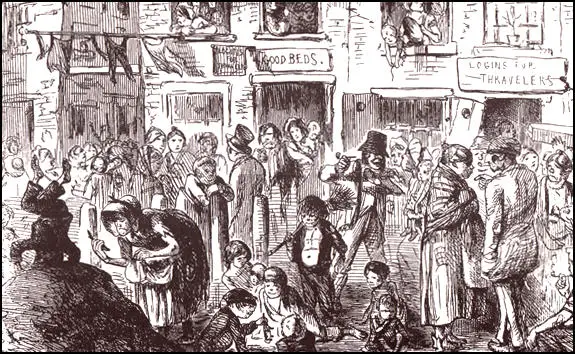
On this day in 1918 Richard Hoggart, the author of The Uses of Literacy: Aspects of Working Class Life (1957) was born in Leeds. In the book Hoggart described how the old, tightly-knit working-class culture of his boyhood was being destroyed by the influence of American culture and was "full of corrupt brightness, of improper appeals and moral evasions". He added: "The hedonistic but passive barbarian who rides in a fifty-horse-power bus for threepence, to see a five-million dollar film for one-and-eightpence, is not simply a social oddity; he is a portent."
Nicholas Wroe has argued: "The publication of The Uses of Literacy in 1957 propelled Richard Hoggart, then an extramural lecturer at the University of Hull, to the forefront of the changes that swept British culture from the sclerotic 1950s into the swinging 60s. The book was a groundbreaking study of working-class culture and a critical appraisal of the changes wrought by the commercial forces... Not only did it anticipate the opening-up of the cultural landscape, it also contributed to a critical and popular climate far more receptive to the subsequent explosion of books, films and art about working-class subjects by working-class artists."
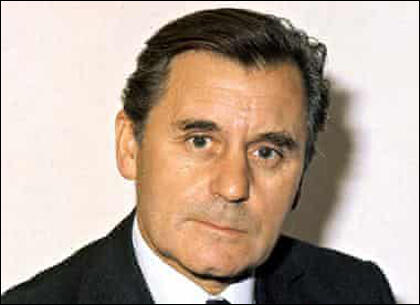
On this day in 1922 the Independent Socialist Party merged with the German Social Democratic Party and elected Karl Kautsky as its leader. The Social Democratic Party continued to be the largest party in the Weimar Republic until July 1932 when the National Socialist German Workers Party (NSDAP) won 230 seats to the SDP's 133. The SDP voted against the Enabling Act in March, 1933, which gave Adolf Hitler dictatorial powers. The Nazi Party banned the SDP in June 1933 and most of its leaders were arrested and sent to concentration camps.
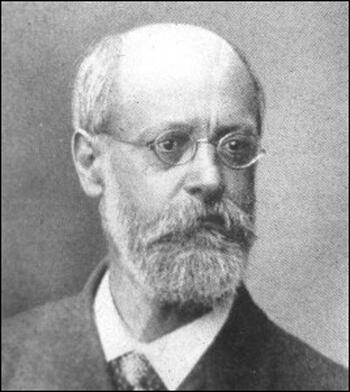
On this day in 1935 the National Representation of the Jews in Germany issue a response to the passing of the Nuremberg Laws on Citizenship and Race. Germans were already encouraged not to use Jewish doctors and lawyers. Jewish civil servants, teachers and those employed by the mass media were sacked. Members of the SA put pressure on people not to buy goods produced by Jewish companies. For example, the Ullstein Press, the largest publisher of newspapers, books and magazines in Germany, was forced to sell the company to the NSDAP in 1934 after the actions of the SA had made it impossible for them to make a profit. Many Jewish people who could no longer earn a living left the country. The number of Jews emigrating increased after the passing of the Nuremberg Laws. Under this new law Jews could no longer be citizens of Germany. It was also made illegal for Jews to marry Aryans.
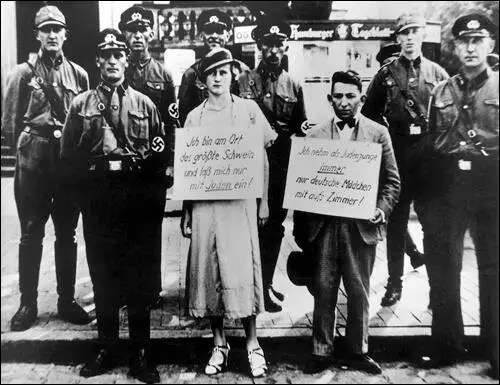
woman, were forced to carry signs discouraging Jewish-German integration.
On this day in 1940 the Luftwaffe bombed the Supermarine factory building making Spitfires in Southampton. Much of the factory was destroyed and 110 people were killed. This was a huge set-back as the Royal Air Force had ordered over 4,000 of these aeroplanes. During the Battle of Britain the RAF had 32 squadrons of Hawker Hurricanes and 19 squadrons equipped with Spitfires. It was decided to use the Hurricanes against the massive bomber formations of the Luftwaffe whereas the Spitfires were employed against German fighters.
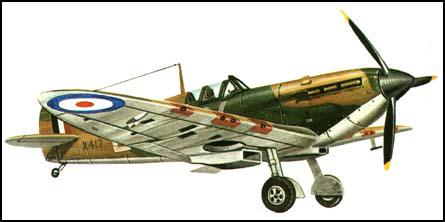
On this day in 1942 Lise de Baissac, a member of Special Operations Executive (SOE), became the first woman agent to parachuted into France. A British army officer later claimed: "The part she played in aiding the Maquis and the British underground movement in France cannot be too highly stressed and did much to facilitate the Maquis preparations and resistance prior to the American breakthrough in Mayenne." According to her Special Operations Executive file: "She was the inspiration of groups on the Orne and by her initiative caused heavy losses to the Germans with tyre bursters on the roads near St Aubin-le-Desert, St Mars, and as far as Laval, Le Mans and Rennes. She also took part in several armed attacks on enemy columns."
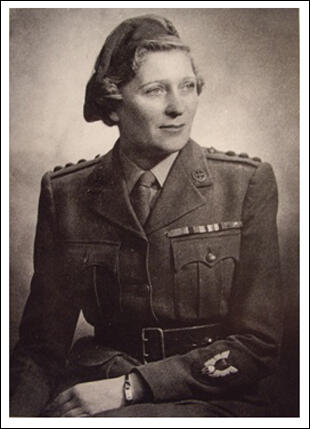
On this day in 1955 President Dwight D. Eisenhower suffered a heart attack on vacation in Denver. He made a full recovery and in 1956 Eisenhower defeated Adlai Stevenson again. This time the margin was even greater with Eisenhower winning 35,585,316 votes to Stevenson's 26,031,322. The following year he controversially sent federal troops to Little Rock to enforce the Supreme Court decision to desegregate schooling.
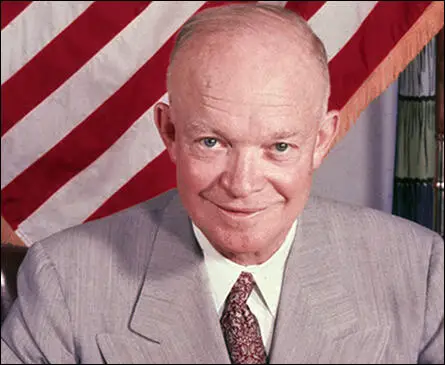
On this day in 1957, President Dwight D. Eisenhower, went on television and told the American people that the reputation of the country was being damaged because of the crisis at Little Rock Central High School: "At a time when we face grave situations abroad because of the hatred that communism bears towards a system of government based on human rights, it would be difficult to exaggerate the harm that is being done to the prestige and influence and indeed to the safety of our nation and the world. Our enemies are gloating over this incident and using it everywhere to misrepresent our whole nation. We are portrayed as a violator of those standards which the peoples of the world united to proclaim in the Charter of the United Nations."
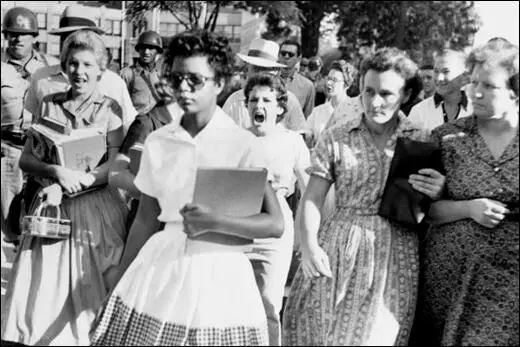
On this day in 1991, the cartoonist, Theodor Seuss Geisel, (Dr. Seuss) died. Geisel was very strongly opposed to the racial policies of Adolf Hitler. After the outbreak of the Second World War he joined the campaign to persuade President Franklin D. Roosevelt to give full support to the Allies. In June 1940 he became staff cartoonist for the PM newspaper. It accepted no advertising in an attempt to be free of pressure from business interests. In its first editorial, that appeared on the front page, Ralph Ingersoll, the editor, wrote: "We are against people who push other people around" and demanded support for the Allies in the war. It has been described as "one of the most controversial and unusual left-leaning American newspapers of all time."
